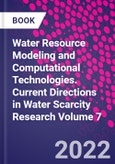Water Resource Modeling and Computational Technologies, Seventh Edition provides the reader with a comprehensive overview of the applications that computational techniques have in various sectors of water resource engineering. The book explores applications of recent modeling and computational techniques in various sectors of water resource engineering, including hydroinformatics, irrigation engineering, climate change, hydrologic forecasting, floods, droughts, image processing, GIS, water quality, aquifer mapping, basin scale modeling, computational fluid dynamics, numerical modeling of surges and groundwater flow, river engineering, optimal reservoir operation, multipurpose projects, and water resource management. As such, this is a must read for hydrologists, civil engineers and water resource managers.
Please Note: This is an On Demand product, delivery may take up to 11 working days after payment has been received.
Table of Contents
Section I
Introduction
1. Artificial intelligence and machine learning in water resources engineering
Section II
Application of Artificial Intelligence to Water Resources
2. Demystifying Artificial Intelligence amidst Sustainable Agricultural Water Management
3. Bidirectional Long Short-Term Memory Based Empirical Wavelet Transform: a New Hybrid Artificial Intelligence Model for Robust Prediction of Soil Moisture Content
4. Fuzzy logic modeling of groundwater potential in Marinduque, Philippines
5. Soft-computing approach to scour depth prediction under wall jets
Section III
Image Processing Applications in Water Resources
6. Assessment of Water Resources using Remote Sensing and GIS Techniques
7. Establishing Spatial Relationships Between Land Use and Water Quality Influenced by Urbanization
8. Satellite sensors, machine learning and river channel unit types: A review
9. Geospatial modeling in the assessment of environmental resources for sustainable water resource management in a semi-arid region: A GIS approach
10. Study of morphologic changes of Arvand River in the past and predicting its future changes
11. Rainfall runoff modelling using GIS: a case study of Gonbad Kavous, Iran
12. GIS-Based Hydrological Models for a Sustainable Groundwater Management: An Overview
13. Development of Rainfall-Runoff Model Using ANFIS with an Integration of GIS: A Case Study
14. Assessing the impact of land use and land cover changes on the water balances in an urbanized peninsular region of India
Section IV
Advances in Hydroinformatics mitigation
15. Random Vector Functional Link Network based On Variational Mode Decomposition for Accurate Prediction of River Water Turbidity
16. Water Quality Management: Development of a Fuzzy based index in Hydroinformatics platform
17. Appraisal Of Multi-Gene Genetic Programming For Estimating Optimal Properties Of Lined Open Channels With Circular Shapes Incorporating Constant And Variable Roughness Scenarios
18. Geoinformatics based assessment of gross irrigation requirement of different crops grown in the south-western region of Haryana, India
Section V
Advances in Watershed Modelling
19. Theorical background and application of numerical models to surface water resources
20. Prophecy of groundwater fluctuation through SVM-FFA hybrid approaches in arid watershed, India
21. Basin-scale Subsurface Hydrology: Modelling of a stressed and data-scarce aquifer using hillslope-based approach
Section VI
Advances in Numerical Modelling in Water Resources
22. Multiphysics modelling of groundwater flow on the example of a coupled thermo-hydro-mechanical model of infiltration of water warmer or cooler than the surroundings.
23. Hydro-Salinity Modeling of Water and Salt Dynamics in Irrigated Soil Groundwater Systems
Section VII
Optimization Techniques and Analytical Formulations in Water Resource
24. Multi-objective optimization techniques for urban water management: An Agent Modeling Approach
25. Hybrid Extreme Learning Machine Optimized Bat Algorithm based on Ensemble Empirical Mode Decomposition for Modelling Dissolved Oxygen in River
26. Application of machine learning models to side-weir discharge coefficient estimations in trapezoidal and rectangular open channels
Section VIII
Advances in Sediment Transport Modelling and River Engineering
27. The hole size analysis of bursting events around mid-channel bar using the conditional method approach
28. Magnitude Frequency Analysis of Sediment Transport: Concept, Review and Application
29. Last Century Evolution of Local Scour Measuring Techniques
Section IX
Computational Intelligence in Extreme Hydrology: Flood and Droughts
30. Understanding trends and its variability of rainfall and temperature over Patna (Bihar)
31. A review of climate change trends and scenarios (2011-2021)
32. Climate change and trend analysis of precipitation and temperature: a case study of Gilan, Iran
33. Innovative Triangular Trend analysis of monthly precipitation at Shiraz station, Iran
34. Understanding Rainfall Variability and Trends in Arid Region of Rajasthan, India
35. Flash Floods and their Impact on Natural Life Using Surface Water Model and GIS Technique at Wadi Degla Natural Reserve Area, Egypt
36. GLOF Early Warning System
Computational Challenges and Solutions
37. Flood Forecasting using novel ANFIS-WOA approach in Mahanadi river basin, India








